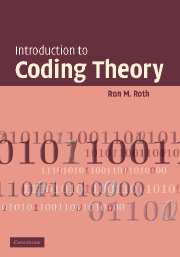Book contents
- Frontmatter
- Contents
- Preface
- 1 Introduction
- 2 Linear Codes
- 3 Introduction to Finite Fields
- 4 Bounds on the Parameters of Codes
- 5 Reed–Solomon and Related Codes
- 6 Decoding of Reed–Solomon Codes
- 7 Structure of Finite Fields
- 8 Cyclic Codes
- 9 List Decoding of Reed–Solomon Codes
- 10 Codes in the Lee Metric
- 11 MDS Codes
- 12 Concatenated Codes
- 13 Graph Codes
- 14 Trellis and Convolutional Codes
- Appendix: Basics in Modern Algebra
- Bibliography
- List of Symbols
- Index
14 - Trellis and Convolutional Codes
Published online by Cambridge University Press: 05 June 2012
- Frontmatter
- Contents
- Preface
- 1 Introduction
- 2 Linear Codes
- 3 Introduction to Finite Fields
- 4 Bounds on the Parameters of Codes
- 5 Reed–Solomon and Related Codes
- 6 Decoding of Reed–Solomon Codes
- 7 Structure of Finite Fields
- 8 Cyclic Codes
- 9 List Decoding of Reed–Solomon Codes
- 10 Codes in the Lee Metric
- 11 MDS Codes
- 12 Concatenated Codes
- 13 Graph Codes
- 14 Trellis and Convolutional Codes
- Appendix: Basics in Modern Algebra
- Bibliography
- List of Symbols
- Index
Summary
In Chapter 1, we introduced the concept of a block code with a certain application in mind: the codewords in the code serve as the set of images of the channel encoder. The encoder maps a message into a codeword which, in turn, is transmitted through the channel, and the receiver then decodes that message (possibly incorrectly) from the word that is read at the output of the channel. In this model, the encoding of a message is independent of any previous or future transmissions—and so is the decoding.
In this chapter, we consider a more general coding model, where the encoding and the decoding are context-dependent. The encoder may now be in one of finitely many states, which contain information about the history of the transmission. Such a finite-state encoder still maps messages to codewords, yet the mapping depends on the state which the encoder is currently in, and that state is updated during each message transmission. Finite-state encoders will be specified through directed graphs, where the vertices stand for the states and the edges define the allowed transitions between states. The mapping from messages to codewords will be determined by the edge names and by labels that we assign to the edges.
The chapter is organized as follows. We first review several concepts from the theory of directed graphs. We then introduce the notion of trellis codes, which can be viewed as the state-dependent counterpart of block codes: the elements of a trellis code form the set of images of a finite-state encoder.
- Type
- Chapter
- Information
- Introduction to Coding Theory , pp. 452 - 520Publisher: Cambridge University PressPrint publication year: 2006



